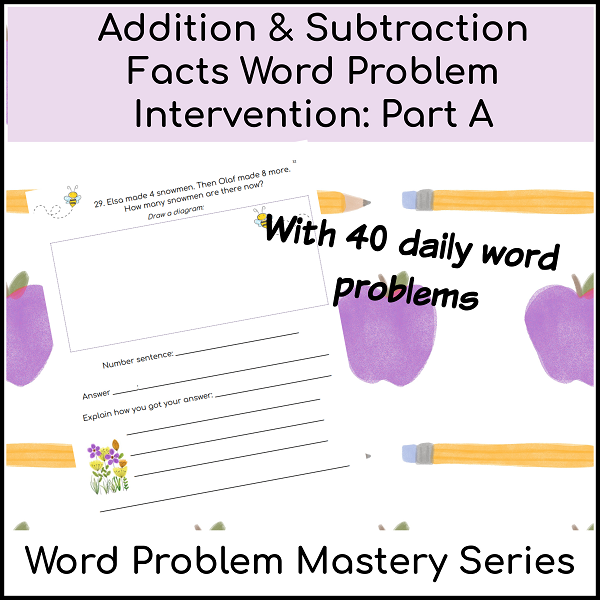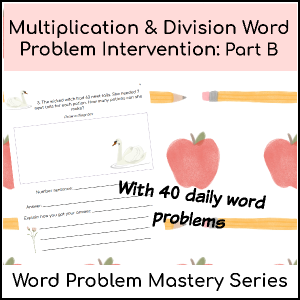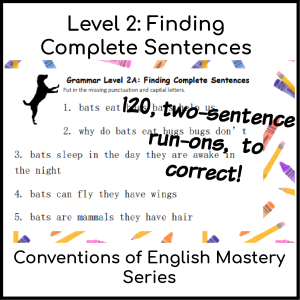Addition & Subtraction Word Problem Intervention: Part A
$3.99
Build students’ word problem skills with this intervention series for RTI and special education groups! Help students master one-step word problems with addition and subtraction facts with this book. For a detailed preview of the product, click here!
Description
About the Word Problem Mastery Series
The word problem mastery series has been designed to help students with disabilities and mathematics difficulties systematically build word problem skills. While other programs confuse complexity of computation with linguistic complexity, the workbooks in this program tease the two apart, with levels (1-4) describing the complexity of the computations and parts (A, B, or C) the complexity of the language. With every problem, students are asked to show their work, to write a number sentence, and to explain their reasoning. The goal is not for students to get a right answer—it’s for them to build the reasoning, problem solving, and explanation skills that they need to succeed on standards-based assessments.
This Product
Addition & Subtraction: In Level 1 of the series, the word problems focus on addition and subtraction facts with, at the end, some two-digit problems. In part A, the language is simple with problems like, “The bat ate seven bugs. Then he ate six more. How many bugs did he eat?”
This workbook includes:
- 40 daily word problems written to be relevant to students’ lives
- A detailed answer key, including examples of how students might solve the problem and complete sentence answers
- A placement test, also available free, to help you find the just-right level for your students
- Work pages for every problem with places for students to show their work, to write number sentences, and for them to put their answers in context
Levels of the Word Problem Mastery Series
Addition & Subtraction: In Level 1 of the series, the word problems focus on addition and subtraction facts with, at the end, some two-digit problems.
- Part A: In part A, the language is simple with problems like, “The bat ate seven bugs. Then he ate six more. How many bugs did he eat?”
- Part B: In part B, the problems are one-step, but with less clear language such as, “I am 2 years older than my brother. He is 9. How old am I?”
- Part C: Part C includes problems with complex language such as, “Mrs. Vanwinkle got nine crayfish. Three died. Then four more were born. How many does she have now?”
Advanced Addition & Subtraction: In Level 2 of the series, the word problems focus on two- and three-digit addition and subtraction.
- Part A: In part A, the problems are one step with both straight-forward and slightly more complex language such as, “The final score for the game was Cavaliers 77, Heat 92. Who won? By how much?”
- Part B: In part B, the problems are similar to part A but also include problems with extra information such as, “Claudio walked for the first time today! He took 2 steps, fell down, and took 5 more steps! Then he started crawling and crawled for 5 minutes. How many steps did he take?”
- Part C: Part C builds on the complexity of Parts A and B with problems such as, “I spent 110 minutes on my homework on Monday, 97 minutes on Tuesday, and 92 minutes on Wednesday. On which night did I spend the most time on my homework? How much more did I work that night than on the night I worked the least?”
Multiplication & Division: In Level 3 of the series, the word problems focus on multiplication and division facts with, in parts B and C, addition and subtraction review.
- Part A: In part A, the problems all focus on multiplication or division and use straight forward language such as, “Leon sold 8 paintings for $9 each. How much money did he make?”
- Part B: The problems in part B are mixed, with addition, subtraction, multiplication, and division. Each problem uses fairly straight forward language, like, “A high school football game has four quarters. Each quarter is 12 minutes long. How long is the game?”
- Part C: The problems in part C include all four operations, with slightly more complex language, fractions (e.g., one half of them), and beginning two-step problems such as, “Three squirrels found a pile of nuts. Each squirrel took nine nuts. There were four nuts left in the pile. How many nuts were there before the squirrels came and took some?”
Advanced Multiplication & Division: In Level 4 of the series, the word problems include a mixture of advanced addition and subtraction and multi-digit multiplication and long division.
- Part A: The problems in part A include all four operations, but each problem requires only one operation to solve such as, “A grizzly bear walked for four hours. It made it 50 miles. How fast was it walking?”
- Part B: The problems in part B include all four operations and require conversions such as minutes to hours or finding a fraction of a number as in, “There are about 58,000 bees in a hive. One fourth of them are the pollen collectors who get food for the hive. How many bees in a hive are pollen collectors?”
- Part C: The problems in part C are the most complex in the series, often requiring students to engage in multiple computations or to compare amounts like in this problem; “Peregrine falcons can travel 15,500 miles in a year. A caribou travels about 800 miles a year. If both animals live to be 15 years old, how much further will the falcon have travelled?”
Common Core Alignment
Across the levels, the series is aligned with several Common Core Standards, including the Standards for Mathematics Practice 1 (make sense of problems) and 3 (construct viable arguments). In addition, the workbooks align with:
- Use addition and subtraction within 100 to solve one- and two-step word problems involving situations of adding to, taking from, putting together, taking apart, and comparing, with unknowns in all positions CCSS.Math.Content.2.OA.A.1
- Use multiplication and division within 100 to solve word problems in situations involving equal groups, arrays, and measurement quantities CCSS.Math.Content.3.OA.A.3
- Solve multistep word problems posed with whole numbers and having whole-number answers using the four operations, including problems in which remainders must be interpreted CCSS.Math.Content.4.OA.A.3
- Solve word problems involving addition and subtraction of fractions referring to the same whole CCSS.Math.Content.5.NF.A.2
Need More Interventions?
- If you are looking for Common Core aligned interventions that match the goals and assessments in the success kit, check out the store! For writing, we have writing fluency, descriptive writing, and complete sentences interventions. For mathematics, we have word problem and computation interventions from addition facts to long division. Reading interventions are coming soon!
Need IEP Writing Resources?
- Check out the IEP Success Kits! Each kit includes informal assessments in reading, writing, and mathematics as well as present levels (PLOPs or PLAAFPs) templates and an IEP goal bank!
Returns & Refunds
- Not sure the product is right for you? See the store’s refund and returns policy— and try the product risk free for thirty days!
You must be logged in to post a review.













Reviews
There are no reviews yet.